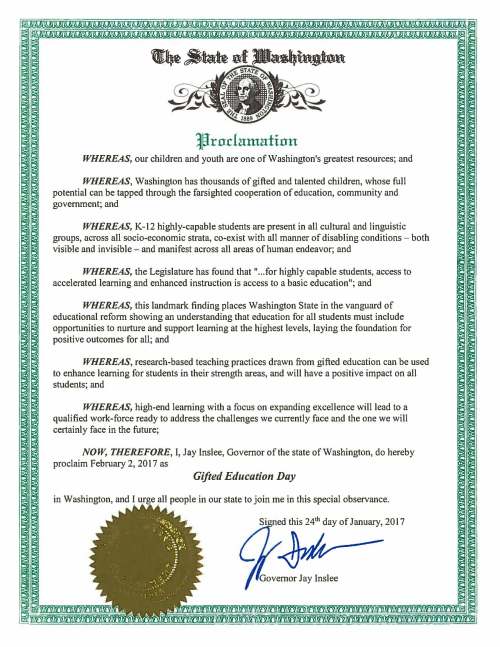On behalf of the highly capable students of Washington State, we are grateful to see increases to highly capable funding in the education plans represented in HB 1843 and SSB 5607. As an element of basic education, and no longer an optional enhancement, the funding formula for highly capable services must be addressed.
Our goal as advocates is to work with the legislature, with OSPI, with school districts, with teachers, and with parents to ensure that access to highly capable services is made more equitable, so that all students who could benefit are referred, identified, and served appropriately. While both HB 1843 and SSB 5607 make some changes to highly capable funding, both continue to rely on a formula for eligible students that does not measure up. The existing cap on funding set at 2.314% of enrolled students is less than half the percentage of students districts identify and serve.
To reach all the students who need highly capable services requires that we do something different. Districts are working to ensure their programs now serve students across the state in grades K through 12, and we’re seeing that reflected in their reports to OSPI. Programs are changing, but funding from the state is not. Districts are continuing to rely on local levy dollars to fund a significant portion of this element of basic education.
In 2010, the Legislature funded the Highly Capable Program Technical Work Group to recommend changes to the highly capable program to make sure that all students, particularly those who have historically been underidentified and underserved, have access to the services they need to succeed. The work group recommended highly capable services be funded at 5% of student enrollment. We ask again today for the state to fund at that level, and to increase the number of hours funded as reflected in the HCPTWG report. The HCPTWG report also recommends the state restore funding to the Destination Imagination, Future Problem Solving, and Centrum programs that have served highly capable learners across the state, and fund staffing at OSPI and our ESDs necessary to support districts as they work to reach all eligible students.
